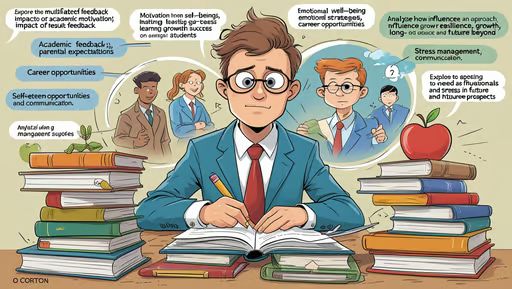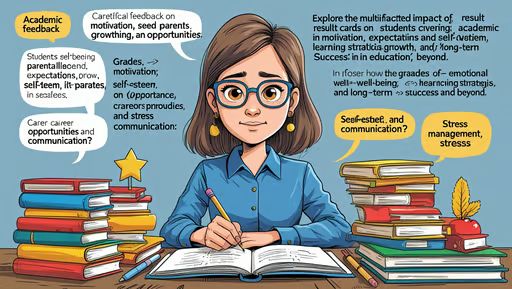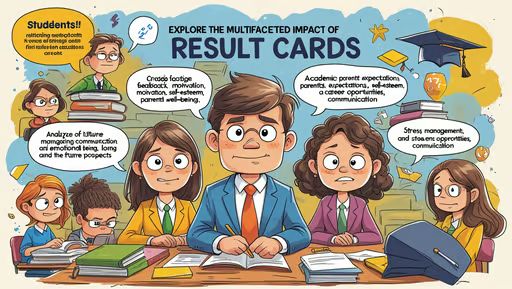Introduction
The Multifaceted Impact of Result Cards on Students, Result cards are a significant milestone in a student’s academic journey, often awaited with a mix of anticipation and anxiety. Far more than just a summary of grades, they serve as a critical tool that shapes a student’s academic progress, emotional well-being, and future opportunities. The influence of result cards extends beyond the classroom, affecting motivation, self-perception, parental relationships, and career trajectories.
This article provides an in-depth analysis of how result cards impact students across multiple dimensions—academically, emotionally, and socially. By understanding these effects, educators, parents, and students themselves can better navigate the challenges and opportunities that come with academic evaluations.
1. Academic Feedback and Improvement
Result cards function as a mirror, reflecting a student’s academic strengths and weaknesses. They provide structured feedback that helps students:
- Recognize Achievements: High grades validate a student’s hard work and reinforce effective study habits.
- Identify Weaknesses: Lower grades highlight areas needing improvement, allowing students to adjust their learning strategies.
- Guide Future Efforts: Teachers’ comments and subject-wise breakdowns help students focus on specific skills, such as problem-solving in math or critical analysis in literature.
Without constructive feedback, students may struggle to gauge their progress. Thus, well-detailed result cards serve as a roadmap for continuous academic growth.

2. Motivation and Goal Setting
Result cards play a crucial role in shaping a student’s motivation:
- Positive Reinforcement: High grades boost confidence and encourage students to maintain or improve their performance.
- Goal Setting: Success inspires students to set higher academic targets, such as aiming for honors programs or competitive scholarships.
- Constructive Failure: Poor grades, while initially discouraging, can act as a wake-up call, prompting students to reassess their study methods, seek help, or develop better time management skills.
However, the impact depends on how students and educators interpret results. A growth mindset—where challenges are seen as opportunities to improve—can transform setbacks into valuable learning experiences.
3. Parental Expectations and Support
Parents often view result cards as a measure of their child’s academic potential, which can lead to varied reactions:
- Supportive Responses: Encouragement from parents helps students stay motivated, especially when they face difficulties.
- Excessive Pressure: Overemphasis on grades can create stress, leading to burnout or fear of failure.
- Constructive Discussions: Instead of punitive measures, parents can use result cards to discuss study habits, tutoring needs, or extracurricular balance.
A balanced approach—where expectations are high but support is unwavering—helps students thrive without feeling overwhelmed.
4. Self-Esteem and Emotional Well-being
Grades can deeply affect a student’s self-perception:
- Confidence Boost: Strong academic performance enhances self-esteem, reinforcing a student’s belief in their abilities.
- Self-Doubt and Anxiety: Repeated low grades may lead to feelings of inadequacy, especially if comparisons with peers come into play.
- Resilience Building: Learning to cope with academic setbacks prepares students for future challenges in higher education and careers.
Educators and parents must recognize the emotional weight of result cards and provide reassurance, emphasizing that grades do not define a student’s worth.
5. Career Opportunities and Future Prospects
Result cards often serve as gatekeepers for future academic and professional opportunities:
- College Admissions: High grades improve chances of acceptance into prestigious universities and specialized programs.
- Scholarships and Financial Aid: Academic excellence can unlock merit-based scholarships, reducing financial burdens.
- Career Pathways: Certain professions (e.g., medicine, engineering) require strong academic records for entry into competitive programs.
Early academic struggles do not necessarily limit future success, but timely interventions—such as tutoring or mentorship—can help students stay on track.
6. Stress and Anxiety Management
The pressure surrounding result cards can lead to significant stress:
- Pre-Result Anxiety: Fear of disappointing parents or teachers can cause sleeplessness and decreased focus.
- Post-Result Reactions: Poor grades may trigger sadness, while high grades can bring relief—or even fear of maintaining performance.
- Coping Mechanisms: Schools can help by promoting stress-management workshops, counseling, and a balanced approach to assessments.
A supportive environment where mistakes are seen as part of learning can reduce unnecessary anxiety.
7. Feedback Loop and Communication
Result cards facilitate essential communication between teachers, students, and parents:
- Teacher Insights: Comments on result cards provide personalized feedback beyond grades, helping students understand their progress.
- Parent-Teacher Collaboration: Discussions based on result cards can lead to tailored support strategies.
- Student Involvement: Encouraging students to reflect on their results fosters accountability and self-directed learning.
This three-way dialogue ensures that academic growth is a collaborative effort.

8. Learning Experience and Continuous Improvement
Rather than being an endpoint, result cards should be viewed as part of an ongoing learning process:
- Adaptive Learning: Students refine study techniques based on feedback.
- Resilience Development: Overcoming academic setbacks builds perseverance.
- Long-Term Growth: Each result card is a checkpoint, not a final judgment.
Schools that emphasize progress over perfection help students develop a lifelong love for learning.
Conclusion
Result cards are powerful tools that influence students far beyond their academic performance. They shape motivation, self-worth, family dynamics, and future opportunities. By fostering a balanced perspective—where achievements are celebrated and challenges are met with support—educators and parents can help students navigate their academic journeys with confidence and resilience.
Ultimately, the goal should not be just high grades, but holistic development—where students learn, grow, and thrive in all aspects of life.

I don’t think the title of your article matches the content lol. Just kidding, mainly because I had some doubts after reading the article. https://www.binance.com/si-LK/register?ref=V2H9AFPY
Can you be more specific about the content of your article? After reading it, I still have some doubts. Hope you can help me.
I don’t think the title of your article matches the content lol. Just kidding, mainly because I had some doubts after reading the article.
Thanks for sharing. I read many of your blog posts, cool, your blog is very good.
I don’t think the title of your article matches the content lol. Just kidding, mainly because I had some doubts after reading the article.
I wanted to thank you for this great read!! I definitely enjoying every little bit of it I have you bookmarked to check out new stuff you post…
Platform Slot Gacor yang Membayar Besar dan Tepat Waktu, hanya di SIGMASLOT
xnbmsy
продать аккаунт магазин аккаунтов социальных сетей
Account Trading Platform Online Account Store
Secure Account Purchasing Platform Account Buying Service
account store secure account purchasing platform
guaranteed accounts account marketplace
secure account sales buy pre-made account
database of accounts for sale account sale
social media account marketplace https://social-accounts-marketplaces.live
account acquisition https://social-accounts-marketplace.live
verified accounts for sale https://accounts-marketplace-best.pro
маркетплейс аккаунтов online-akkaunty-magazin.xyz
buy facebook ads manager https://buy-ads-account.click/
cheap facebook advertising account facebook ad account buy
cheap facebook accounts https://buy-accounts.click
buy google ad threshold account buy google adwords accounts
buy facebook business managers https://verified-business-manager-for-sale.org/
buy tiktok ads https://buy-tiktok-ads-accounts.org
tiktok ads account buy tiktok agency account for sale
Your article helped me a lot, is there any more related content? Thanks!
Your point of view caught my eye and was very interesting. Thanks. I have a question for you.
Keep up the superb piece of work, I read few articles on this site and I think that your web site is really interesting and has lots of great information.
buy fb ads account account trading sell accounts
Great website! I am loving it!! Will come back again. I am taking your feeds also.
I¦ve been exploring for a bit for any high quality articles or blog posts on this kind of space . Exploring in Yahoo I finally stumbled upon this site. Reading this information So i am glad to show that I’ve an incredibly excellent uncanny feeling I came upon exactly what I needed. I such a lot definitely will make sure to do not disregard this website and give it a glance regularly.
I believe you have noted some very interesting points, appreciate it for the post.
Very interesting details you have mentioned, thankyou for putting up. “Above all be true to yourself, and if you can not put your heart in it, take yourself out of it.” by Hardy D. Jackson.
you have a great blog here! would you like to make some invite posts on my blog?
Can you be more specific about the content of your enticle? After reading it, I still have some doubts. Hope you can help me.
Thanks for sharing. I read many of your blog posts, cool, your blog is very good.
Thanx for the effort, keep up the good work Great work, I am going to start a small Blog Engine course work using your site I hope you enjoy blogging with the popular BlogEngine.net.Thethoughts you express are really awesome. Hope you will right some more posts.
As soon as I noticed this site I went on reddit to share some of the love with them.
I am not rattling wonderful with English but I find this real leisurely to read .
Thank you for your sharing. I am worried that I lack creative ideas. It is your article that makes me full of hope. Thank you. But, I have a question, can you help me? https://www.binance.info/register?ref=P9L9FQKY
Thanks for sharing. I read many of your blog posts, cool, your blog is very good. https://www.binance.info/en/register-person?ref=JHQQKNKN
Can you be more specific about the content of your article? After reading it, I still have some doubts. Hope you can help me. https://www.binance.info/en-IN/join?ref=UM6SMJM3
Hi would you mind sharing which blog platform you’re working with? I’m going to start my own blog soon but I’m having a difficult time deciding between BlogEngine/Wordpress/B2evolution and Drupal. The reason I ask is because your design and style seems different then most blogs and I’m looking for something unique. P.S Sorry for being off-topic but I had to ask!
My spouse and I absolutely love your blog and find many of your post’s to be what precisely I’m looking for. Do you offer guest writers to write content to suit your needs? I wouldn’t mind producing a post or elaborating on a lot of the subjects you write concerning here. Again, awesome site!
Thanks for sharing. I read many of your blog posts, cool, your blog is very good.
Heya i am for the primary time here. I came across this board and I find It really useful & it helped me out much. I’m hoping to provide something again and help others like you helped me.
Thanks for sharing superb informations. Your web site is very cool. I’m impressed by the details that you’ve on this web site. It reveals how nicely you understand this subject. Bookmarked this website page, will come back for extra articles. You, my pal, ROCK! I found just the info I already searched all over the place and simply could not come across. What a great site.
Hello there! Quick question that’s completely off topic. Do you know how to make your site mobile friendly? My weblog looks weird when viewing from my iphone4. I’m trying to find a theme or plugin that might be able to correct this issue. If you have any recommendations, please share. Thanks!
Your point of view caught my eye and was very interesting. Thanks. I have a question for you.
Dead composed content, Really enjoyed reading.
I was very pleased to find this web-site.I wanted to thanks for your time for this wonderful read!! I definitely enjoying every little bit of it and I have you bookmarked to check out new stuff you blog post.